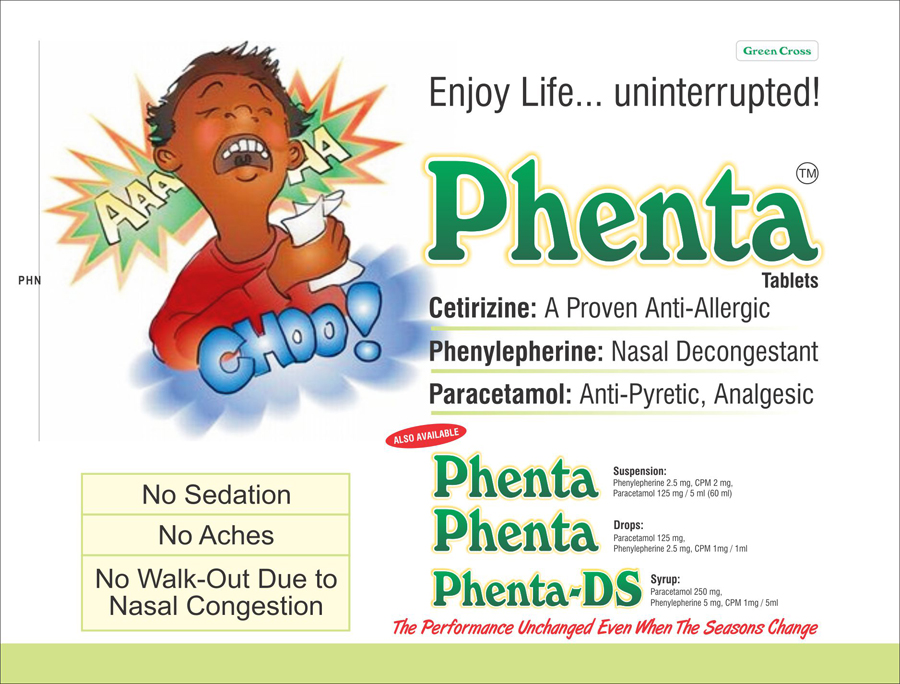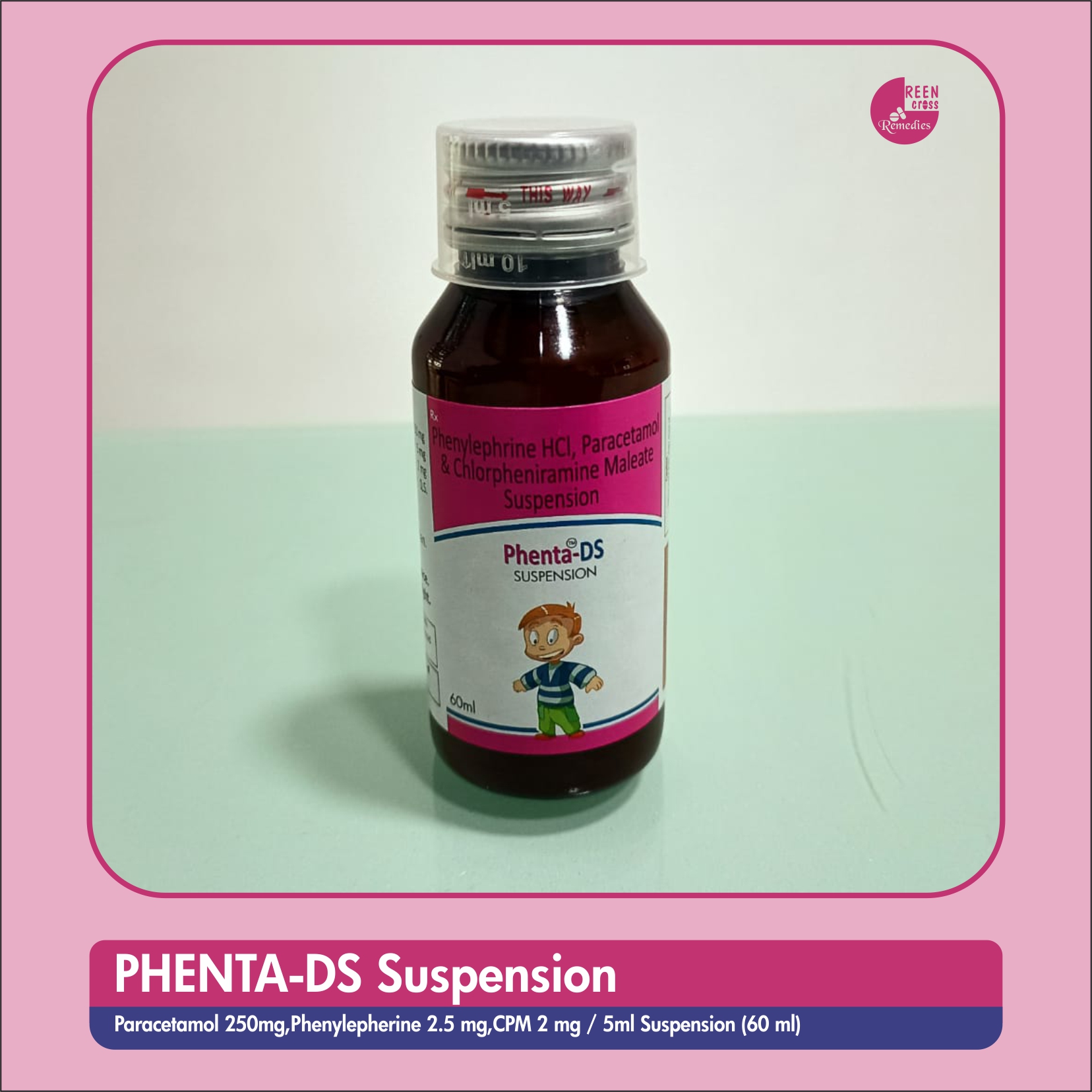PHENTA DS Suspension
Paracetamol 250 mg, Phenylepherine 5 mg, CPM 2 mg / 5 ml Suspension Double Strength Anti Cold Syrup Use, Indication, Side Effects, Dosage, Mechanism of Action, Price, Contra-Indications, Drug Interactions As Description|MRP: 69.70 (60 ml)
Inquiry Now
Paracetamol 250 mg, Phenylepherine 5 mg, CPM 2 mg / 5 ml Suspension Double Strength Anti Cold Syrup Use, Indication, Side Effects, Dosage, Mechanism of Action, Price, Contra-Indications, Drug Interactions...
PHENTA DS Suspension
Each 5 ml Suspension Contains:
Paracetamol 250 mg,Phenylepherine 5 mg,chlorpheniramine maleate {CPM} 2 mg
Double Strength Anti Cold ,Anti Allergic, Anti Pyretic, Analgesic, Nasal Decongestant Medicine For Pediatric Use
PHENTA DS Suspension is a combination medication primarily used for the treatment of symptoms associated with the common cold, flu, and upper respiratory infections.
Uses and Indications:
PHENTA DS Suspension is used for the symptomatic relief of conditions associated with colds and flu, including:
- Fever
- Nasal congestion
- Runny nose
- Sneezing
- Itchy or watery eyes
- Body aches and pains associated with colds and flu
It helps in alleviating symptoms of the upper respiratory tract, including congestion, cough, and sinus pressure.
Mechanism of Action:
- Paracetamol: It is an analgesic (pain reliever) and antipyretic (fever reducer) that works by inhibiting the production of prostaglandins (chemicals that promote inflammation, pain, and fever).
- Phenylephrine: A sympathomimetic drug, phenylephrine is a decongestant that works by constricting blood vessels in the nasal passages, leading to reduced swelling and nasal congestion.
- Chlorpheniramine Maleate (CPM): An antihistamine that blocks histamine (a chemical responsible for allergic reactions), thus reducing symptoms like itching, sneezing, and runny nose. It also has sedative effects that can help with symptoms of anxiety or restlessness caused by colds.
Side Effects:
While PHENTA DS Suspension is effective for treating cold symptoms, it may cause some side effects in certain individuals:
- Common side effects:
- Drowsiness or dizziness (due to chlorpheniramine)
- Dry mouth or throat
- Nausea or upset stomach
- Headache
- Serious side effects (though rare):
- Allergic reactions (rash, swelling, difficulty breathing)
- Liver damage (due to paracetamol overdose)
- Increased blood pressure (due to phenylephrine)
If any of these serious side effects occur, it is crucial to seek medical attention immediately.
Dosage:
The usual dosage for adults and children may vary depending on the specific age and health condition. It's essential to follow the dosage instructions provided by the prescribing doctor or the label on the product. However, a common guideline might be:
- Adults and children over 12 years: 10-15 mL of suspension every 4-6 hours as needed.
- Children (6 to 12 years): 5-10 mL of suspension every 4-6 hours as needed.
- Children (2 to 6 years): 2.5-5 mL every 4-6 hours as needed.
Note: Do not exceed the prescribed dosage to avoid risk of side effects, especially from paracetamol.
Contraindications:
PHENTA DS Suspension should not be used in the following conditions:
- Hypersensitivity: If the person is allergic to any of the ingredients, especially paracetamol, phenylephrine, or chlorpheniramine.
- Severe liver disease: Due to the presence of paracetamol.
- Severe hypertension or heart disease: Due to the decongestant phenylephrine.
- Glaucoma: People with glaucoma should be cautious about taking medications containing antihistamines like chlorpheniramine.
- Pregnancy and breastfeeding: Consult a doctor before using this medication during pregnancy or breastfeeding.
Drug Interactions:
PHENTA DS Suspension may interact with other medications, leading to potential side effects or reduced efficacy. Some possible interactions include:
- Antidepressants (e.g., MAO inhibitors): Using with these medications can increase the risk of severe side effects like increased blood pressure and serotonin syndrome.
- Other antihistamines or sedatives: May increase sedative effects and cause excessive drowsiness.
- Alcohol: Can increase the risk of liver damage, especially with paracetamol.
- Beta-blockers or blood pressure medications: May interact with phenylephrine and cause increased blood pressure.
Always inform your healthcare provider about any medications you are currently taking, including over-the-counter drugs.
For Use of registered medical practitioner or a hospital only

